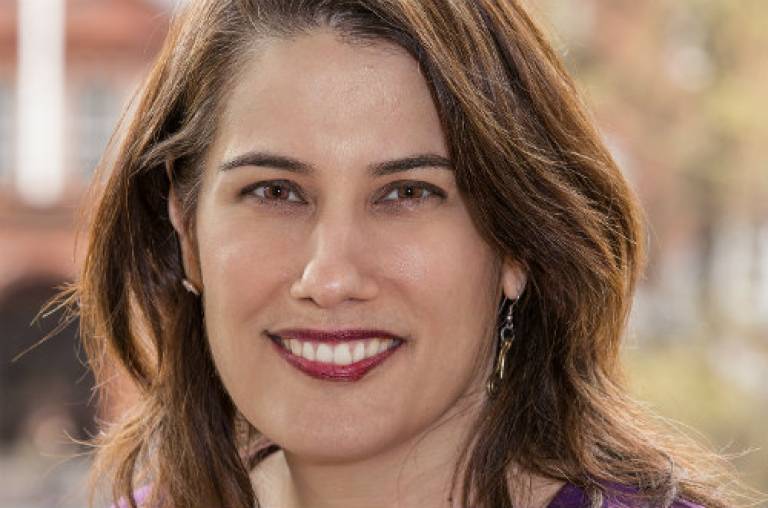Spotlight on Provost's Teaching Award 2016 winner Dr Sunny Bains
21 July 2016

Dr Sunny Bains, Senior Teaching Fellow (UCL Engineering), received a Provost's Teaching Award at this year's Teaching and Learning Conference.
What did your win highlight?
Employers say that communication skills are top of their list of requirements for graduates. Communication takes practice, however. In general, our engineering students will not write unless they get marks for it. Marks means marking, which has to be done quickly enough to provide feedback before the next assignment. Even with the sophisticated rubrics we use and a team of 20+ postgraduate teaching assistants, this is a major challenge with 600-700 students.
I previously developed a training scheme for PGTAs that involved a lot of peer assessment. As is well documented, this approach has significant benefits, because students often find it easier to identify flaws in the work of others than in their own. Developing a critical eye for writing is the first step to being able to write well.
However, in the first iteration, I discovered that peer assessment in a discussion is very different to peer marking. First there was the problem of student acceptance. Some students didn’t feel their peers were qualified to mark them, thought they weren’t getting their money’s worth from the college, and/or didn’t understand why their marks weren’t all in a narrow range. The second issue was that we ran into difficulties using Moodle Workshop that exacerbated problems with student acceptance. Finally, UCL Regulations did not explicitly permit (or forbid) peer-marking when I started the effort, which meant there were no guidelines to work to.
To aid student acceptance, I set the audiences ‘communication assignments’. This meant that each set of markers, with their diverse opinions, could be seen as a focus group. In other words, they can legitimately answer the question: Does this communicate to me?
In addition, I made sure that students were given ample instruction in how the rubrics worked for each peer-reviewed assignment. There were at least two elements of training for each one, one in class and one available online (and required). Another thing I changed is that I required structured comments to justify each mark. This both made markers take more care, and was more satisfying to those being marked. Finally I put in place moderation and appeals processes so that students who felt that they had been unfairly marked had means of redress.
There were three peer-marked assignments where the mark was 100% given through peer-marking and then moderation, etc. One was a video outlining a technical concept related to A-levels related to engineering, the second was an e-mail to their project group, and the third was a research report. What is critical for the assignment to work is that the peer-markers must be in the target audience for the communication.
Fortunately, the same solutions that helped students to accept the programme convinced the college. Thanks to my perseverance and great help from my Faculty Tutor, UCL Board of Examinations has given us express permission to continue with peer marking pending the rewriting of university rules.
We anonymously surveyed our 725 students this year and 405 responded. Of these, 59% said they learned ‘Quite a bit’ or ‘A lot’ from doing the reviewing. Similarly 50% said they learned ‘Quite a bit’ or ‘A lot’ from reading their reviews.
What does this award mean to you?
It’s vindication that I can make as much contribution to the College as a teaching fellow (which is has been traditionally treated as a lower-status position at universities) as I can an academic. Also, to me personally, it’s vindication that the work I’ve done has been genuinely valuable.
What new ways of teaching are you looking into at the moment?
I’ve been experimenting with the use of videos, but not in a wholesale way, I’m planning to develop a lot more video resources over the summer and hope to see the benefits next year.
What advice would you give to a colleague who would like to be more innovative in their teaching?
Ask yourself some questions. What do you think is not working on the course you’re teaching? What solutions are people touting for the problems you are having? Which ones make the most sense to you? Try that one. You don’t need to change everything at once, just take it one problem at a time. Once you start to see the benefits in student understanding and/or engagement, you will want to tackle the next problem and the next and be on an upward spiral.
Student perspective…
I have a huge amount of admiration for Sunny in her efforts to change the approach to education in the engineering department. By deviating from the 'ordinary' way of teaching, I feel like students will leave as more than 'ordinary' engineers.
Rob Shilton
"I think Dr Sunny Bains has been instrumental in delivering the Integrated Engineering Programme. From a student's perspective, I believe her pioneering efforts have added significant value to my educational experience - giving me the key skills which will aid me both in continued studies and in career. I look forward to seeing what she'll do next."
Hasani Ade
 Close
Close

